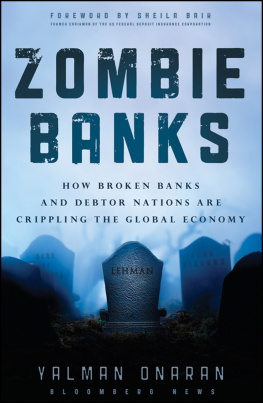Additional Praise forZombie Banks
Yalman Onarans analysis is dead-on. So is his imagery of the dead banks walking among us, stalking and killing the wobbly post-2008 recovery. Zombie Banks clearly and scarily puts together all the pieces that explain a financial world again falling apart. Onaran calls out the culpable, from Wall Streets toady Tim Geithner to Irelands clueless bankers, and writes so lucidly as to render a complex mess understandable.
John Helyar, co-author of Barbarians at the Gate
This book does an excellent job of pointing out the administrative and political pressures that are rampant. I like the contrast used to make the point that Iceland avoided the major errors. Ive always recommended more capital for the banks as the best way out; so does Onaran. The only way is to announce that we will not bail out any firm at any time; that will change their attitude toward more capital. Higher capital requirement puts the risk decision on management and stockholders, where it belongs.
Allan Meltzer, author, A History of the Federal Reserve, and professor, Carnegie Mellon University
Zombie Banks , like the movie Zombieland , is a fun rompuntil you realize this is not fiction. Onaran effectively expands Ed Kanes thesis from the Thrift Crisis, when only a few U.S. institutions were too big to fail, and shows how the program of declaring the end of insolvency by merely refusing to recognize its existence has grown popular, worldwide. Of course, Onaran cant yet tell us the end of the story, but we can surmise that the longer the trend continues the worse the fallout will be.
Joseph Mason, professor, Louisiana State University
Since 1996, Bloomberg Press has published books for financial professionals, as well as books of general interest in investing, economics, current affairs, and policy affecting investors and business people. Titles are written by well-known practitioners, BLOOMBERG NEWS reporters and columnists, and other leading authorities and journalists. Bloomberg Press books have been translated into more than 20 languages.
For a list of available titles, please visit our Web site at www.wiley.com/go/bloombergpress.
Copyright 2012 by Yalman Onaran. All rights reserved.
Published by John Wiley & Sons, Inc., Hoboken, New Jersey.
Published simultaneously in Canada.
No part of this publication may be reproduced, stored in a retrieval system, or transmitted in any form or by any means, electronic, mechanical, photocopying, recording, scanning, or otherwise, except as permitted under Section 107 or 108 of the 1976 United States Copyright Act, without either the prior written permission of the Publisher, or authorization through payment of the appropriate per-copy fee to the Copyright Clearance Center, Inc., 222 Rosewood Drive, Danvers, MA 01923, (978) 750-8400, fax (978) 646-8600, or on the Web at www.copyright.com. Requests to the Publisher for permission should be addressed to the Permissions Department, John Wiley & Sons, Inc., 111 River Street, Hoboken, NJ 07030, (201) 748-6011, fax (201) 748-6008, or online at http://www.wiley.com/go/permissions.
Limit of Liability/Disclaimer of Warranty: While the publisher and author have used their best efforts in preparing this book, they make no representations or warranties with respect to the accuracy or completeness of the contents of this book and specifically disclaim any implied warranties of merchantability or fitness for a particular purpose. No warranty may be created or extended by sales representatives or written sales materials. The advice and strategies contained herein may not be suitable for your situation. You should consult with a professional where appropriate. Neither the publisher nor author shall be liable for any loss of profit or any other commercial damages, including but not limited to special, incidental, consequential, or other damages.
For general information on our other products and services or for technical support, please contact our Customer Care Department within the United States at (800) 762-2974, outside the United States at (317) 572-3993 or fax (317) 572-4002.
Wiley also publishes its books in a variety of electronic formats. Some content that appears in print may not be available in electronic books. For more information about Wiley products, visit our web site at www.wiley.com.
Library of Congress Cataloging-in-Publication Data:
Onaran, Yalman, 1969
Zombie banks : how broken banks and debtor nations are crippling the global economy / Yalman Onaran.
p. cm. (Bloomberg Press)
Includes index.
ISBN 978-1-118-09452-5 (cloth); ISBN 978-1-118-18533-9 (ebk);
ISBN 978-1-118-18532-2 (ebk); ISBN 978-1-118-18531-5 (ebk)
1. Debts, ExternalHistory21st century. 2. Banks and bankingHistory21st century. 3. Economic history21st century. I. Title.
HG3891.5.O53 2011
332.042dc23
2011032158
To Dad, who said he bargained with the Grim Reaper to delay the day until this books publication, and
To Mom, whose habit of playing the devils advocate in debates taught me to consider opposing views more easily.
Foreword
Many books have been written about the financial crisis. They are, perhaps, getting better with age. Perspective improves as time passes. Economic truisms that were obfuscated in the informational fog that surrounded the financial crisis are coming back into focus as the fog clears.
In the years leading up to the crisis, we somehow lost our way. We confused free markets with free-for-all markets. We transitioned from a society that valued hard work and entrepreneurship to one that worshipped housing speculation and financial arbitrage.
In the fall of 2008, we got our comeuppance, as an economy based on over-leveraged consumers, inflated real estate prices, and artificial derivatives products finally collapsed.
The Great Recession was not the product of an inevitable business cycle. It was caused by the excessive risk taking of a number of large financial institutions. Investors and creditors supported them, notwithstanding their high flying ways, because of the perception that the government would not let them fail. The smart money played the system.
And the smart money was right.
Instead of using the crisis as an opportunity to clean out the system, we bailed out most of the inefficient institutions and left the bad assets to rot on their balance sheets. Within a year, those who had been bailed out were paying themselves bonuses while many of the bailers were losing their houses, their jobs, or both.
To be sure, some of the stabilization measures undertaken in the United States were dictated by limitations on the legal tools that were available to close down failing institutions in an orderly way. And notwithstanding the shortcomings of our efforts, we did force our banks to raise significant amounts of new capital and dramatically reduce reliance on short-term funding. As a consequence, U.S. banks are much more stable today than their European counterparts.
But as Yalman Onaran points out in this highly readable book, by bailing out mismanaged institutions, we repeated the mistakes of Japans lost decade and of our own savings-and-loan debacle.
By propping up failing firms, we penalized the well-managed institutions and interfered with the basic functioning of the market. We cannot rely on our capitalist system to allocate resources for their most productive use unless we let the inefficient or mismanaged fail.
We did not force our financial institutions to shed their bad assets and recognize the losses. And the lingering uncertainty about the true extent of those losses makes previously profligate management more risk averse in an economy where prudent risk taking and lending are most needed, particularly by small businesses.









